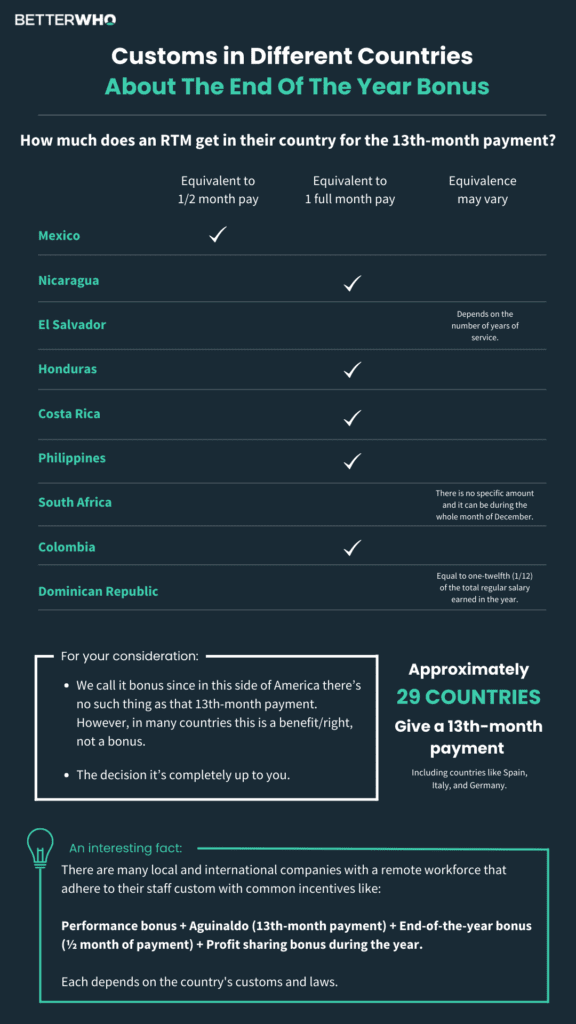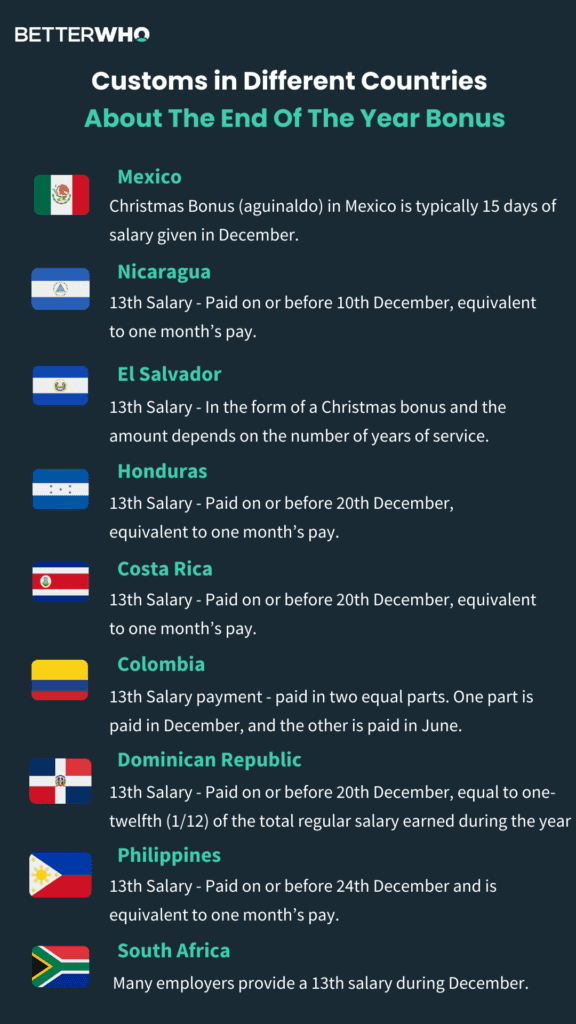“What is the aguinaldo or 13-month payment? Should I give my RTM a 13-month bonus?”
We know you have asked yourself and your peers in the industry about that end-of-the-year bonus or 13th-month payment for your remote team members.
It’s a very interesting topic because it varies depending on country.
First off, let’s gain some clarity on what exactly the 13th month’s pay is…
The 13th month’s pay is the payment of an additional month’s salary, a form of compensation, in the financial year.
Its eligibility depends on each country’s law (and your RTM might be used to that if it’s the norm in their country), but it’s not mandatory for remote workers, who act as freelancers in relation to US companies (because they are not employed by an entity that needs to observe that country’s law).
As mentioned in the article “Revisiting 13th and 14th Month Bonus Rules…” by Human Capital Solutions; there are some countries where this is just a custom, while in the majority it’s a law, and not only in Latin America but around the world. However, the law, of course, only applies to companies that have a legal entity in that country.
That said, although it isn’t required, many entrepreneurs give a 13th-month bonus to reward and motivate their remote team members and at the same time make them feel at home.
Alternatives to the 13th-month pay can be:
- Offering a higher wage of payment instead of a one-time bonus at the end of the year.
- Giving a monthly performance bonus which is also a custom in most countries.
- Another common practice is dividing the end-of-the-year bonus into a monthly/quarterly/twice-a-year performance bonus.
These are our suggestions for best practices:
- Have the conversation with your team members:
If you already have a monthly incentive program, is it necessary to give an end-of-the-year bonus? – Ask them what they would prefer while setting the right expectations. You may be surprised about their preferences, it’s a common practice but not expected or preferred by everyone. - Include it in your offer letter or agreement.
There is nothing better than having the game rules clear from the very beginning. This way you’ll avoid misunderstandings in the future. Clarify expectations and decide on what makes sense for both.
- Referring to it as a payment makes more sense for some RTMs.
What US companies may call a bonus is something the RTMs may actually see as a regular payment. Because it’s a law in their country, they may be accustomed to seeing this as a normal part of their annual payment. Even if they are now dealing with a different set up, it’s just a matter of what they’re used to. We may be used to seeing it as a bonus or extra pay due to the nature of the US system, but it’s a very important and expected custom in most of the countries our RTMs work from.
- You can prorate the bonus:
If your RTM has been with you only for a few months, you can pro-rate the equivalent of their time working for an end-of-the-year bonus (this varies from country to country).
Other important facts to consider:

When Does The 13-month Payment Need to Be Done?
This will depend on each country’s customs and laws, but most of them happen before December 20th to fit as an “end-of-the-year” bonus/payment.
Here is a chart that will help you understand the practice from the most common countries our Remote Team Members work from.

Helpful Tips for the 13th-month payment conversation
Setting a Precedent
Planning your raise or reward structure ahead of time will save you from future inconveniences or misunderstandings. Knowing about this topic will also help ensure that future raises or bonuses comply with the right expectations and fit your budget.
Documentation
Make sure to track raises and keep track of your remote team member’s work performance for easy reference in the future.
Have the conversation and ask for feedback
Asking for feedback from your RTMs will allow you to change things or processes at the right moment. You can revise it and be assured that it will bear a positive impact in the future.
Be open to having that conversation and ask as many questions as necessary to fit their needs and customs, there are plenty of agreements or ideas that you can implement with your team members.




